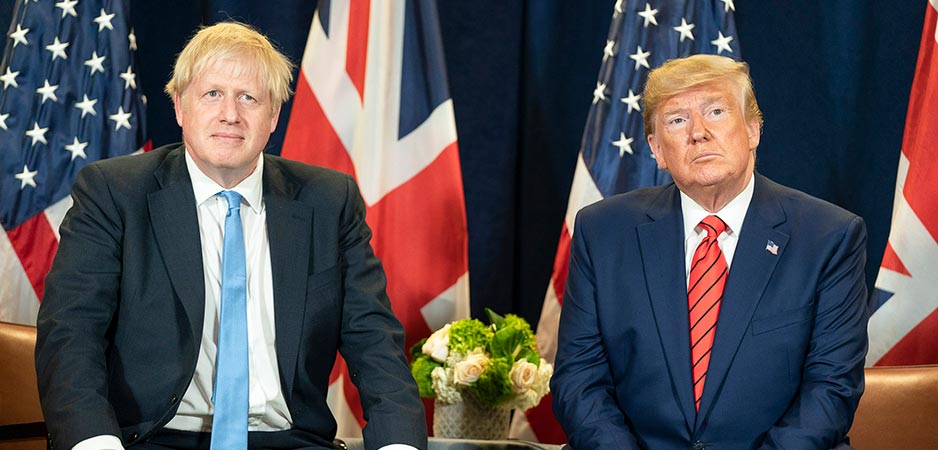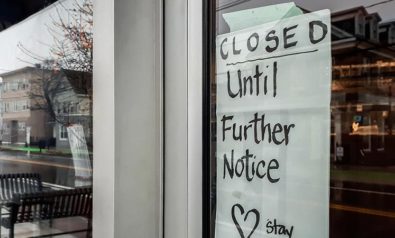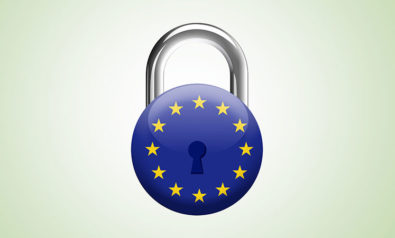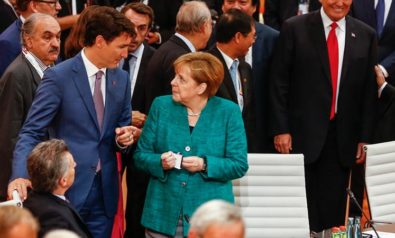In 1978-79, the United Kingdom experienced the winter of discontent. Trade unions around the country went on strike. On January 22, 1979, the UK experienced the largest strike action since the General Strike of 1926. Even gravediggers and waste collectors joined in, leaving corpses and rubbish piling up. A bitterly cold winter with blizzards and heavy snowfall dampened animal spirits further. To quote one of this author’s former tutors, “the country was in the gutter.”
One Antidote to Coronavirus: More Multilateralism
Throughout the 1970s, the British economy had been ailing. The 1973 oil crisis had triggered a global recession and high inflation. The British government tried hard to be fiscally responsible, control inflation and avoid a large increase in unemployment. The only way to achieve all three goals was to curb wages. Sadly for Jim Callaghan, the then British prime minister who hailed from the Labour Party, the workers revolted and the economy wilted.
Sensing Labour’s weakness, Margaret Thatcher, the Conservative leader of the opposition, pounced. She tabled a motion of no-confidence that Callaghan lost by a single vote on March 28, 1979. A general election followed in May. Thatcher won a historic victory with 5.2% of British voters swinging from Labour to Conservative. Not since 1945, when Clement Attlee became prime minister, had so many voters switched sides.
No Such Thing as Society
Unlike Tony Blair or David Cameron, Prime Minister Thatcher was a conviction politician. As an undergraduate at Oxford, she was deeply influenced by “The Road to Serfdom,” a 1944 classic by the Austrian economist Friedrich von Hayek, a friend and rival of the legendary John Maynard Keynes. Von Hayek made a sophisticated case against socialism, arguing that it “tends always to totalitarian outcomes, regardless of the intentions, professed or real, of its proponents.” Thatcher was one of von Hayek’s true believers.
It is easy to forget today that von Hayek was largely forgotten after 1945. World War II marked the triumph of Keynesian ideas. The commanding heights of the economy were occupied by the state in an all-out war effort. As a result, a full employment economy emerged that left the ravages of the Great Depression behind. Attlee’s 1945 victory led to the establishment of the National Health Service (NHS). Henceforth, regardless of whether a Labour or Conservative prime minister occupied 10 Downing Street, the British economy was run on Keynesian ideas.
In von Hayek’s words, “Keynes died and was raised to sainthood” while he was discredited and forgotten. It was only the economic crises of the 1970s that brought von Hayek back into fashion. Thatcher went on to put his ideas into practice. The grocer’s daughter believed in enterprise, thrift and self-reliance, not handouts from or dependence on the government. She did not want people to cast “their problems on society.” In fact, she forcefully argued that “there is no such thing as society. There are individual men and women and there are families.”
In the Thatcherite worldview, obligations came before entitlements, governments can do nothing except through people, and people had to look after themselves first. As per the Iron Lady, “It is our duty to look after ourselves and then, also, to look after our neighbours.” The fact that some people did not work because they could go on state benefits infuriated her.
Thatcher’s moral clarity set the UK on a fresh course. She broke the back of unions, rolled back the state, let uncompetitive British industry die and brought in “Big Bang” reforms that made the City of London a rival to New York. Thatcher pulled not only her fellow Conservatives but also the rival Labour Party to the right. In the 1990s, Tony Blair and Gordon Brown created New Labour by abandoning their party’s cherished old principles. The duo became Thatcher’s children and venerated markets when they ran the government between 1997 and 2010.
Government Is the Problem
In 1980, the US emulated the UK in moving to the right by voting in Ronald Reagan as president. Throughout the 1970s, the US suffered from low economic growth, persistent inflation and high unemployment. The Iran hostage crisis of 1979-80 destroyed faith in the government and in Jimmy Carter’s credibility, paving the way for Reagan.
The new president believed in supply-side economics. As per this theory, economic policy must focus on increasing the supply of goods and services for consumers. This can best be achieved by lowering taxes and decreasing regulation. Once businesses produce more goods and services that consumers purchase, employment rises, wealth increases and the economy booms.
Unlike Thatcher, Reagan was not an educated man. He is not known to have read many books. Yet this Hollywood actor for whom Franklin D. Roosevelt was a “true hero” had a Damascene conversion and turned against government. Like Thatcher, President Reagan believed in individual enterprise and free markets. In his view, reforms that “get government off our backs” and “out of our pockets” lead to more jobs and a better economy.
In his inaugural address, Reagan declared that “government is not the solution to our problem, government is the problem.” Now, Reagan is venerated by American conservatives as a prophet. Along with Thatcher, he changed the global zeitgeist. For him, the mighty Soviet Union was the “evil empire” and free markets were the best way to protect individual liberty. To this day, his iconic words hold sway: “The nine most terrifying words in the English language are: I’m from the Government, and I’m here to help.”
The Soviet Union collapsed in 1991, vindicating Reagan’s faith in markets, not government. When Bill Clinton became president in January 1993, he acted as Reagan’s dutiful son, signing off on welfare reforms and on the repeal of the Roosevelt-era Glass-Steagall Act of 1933. This monumental legislation separated investment banking from retail banking and was a reaction to the terrible stock market crash of 1929. Yet despite warnings of dire consequences from the likes of Byron Dorgan, the North Dakota senator at the time, Clinton gave Glass-Steagall an unceremonious burial.
There Really Is Such a Thing as Society
Unlike the financial crisis of 2007-08, the current coronavirus pandemic has changed the trajectory of politics and economics. The response to the 2007-08 crisis was fiscal stimulus and monetary easing. The global economy did avoid collapse, but the gains of the bailout ended up in the pockets of the wealthy. In fact, $1.6 billion of US taxpayer money went to top executives in the form of salaries, bonuses and other benefits.
The bailouts were nothing but socialism on the downside and capitalism on the upside. The wealthy kept all their returns while the public was left with the risk. Unlike Roosevelt, President Barack Obama proved too pusillanimous to take on Wall Street. As a brilliant PBS documentary has chronicled, the Obama administration prosecuted small fry but steered clear of the big fish. It is widely whispered that Obama did not want to be seen as an angry black man and prized stability over reform.
The failure of the US president and the legislators to act left a searing sense of injustice that fueled both the Tea Party and Occupy Wall Street movements. Eventually, it paved the path to the White House for Donald Trump in 2016. At the time, the government just made the big banks bigger and business went on as usual. Central banks hosed economies with cash, which boosted the price of assets. The rich became richer. Even as stock markets surged, inequality soared.
In 2020, the coronavirus pandemic has brought markets around the world to their knees. Governments have imposed lockdowns and the global economy is in recession. Instead of individuals taking care of themselves and their neighbors, governments are stepping in. The Conservatives have announced a £350 billion ($433 billion) stimulus for the British economy.
On March 17, Chancellor of the Exchequer Rishi Sunak declared: “This is not a time for ideology and orthodoxy, this is a time to be bold, a time for courage. I want to reassure every British citizen this government will give you all the tools you need to get through this.” British Prime Minister Boris Johnson, who is self-isolating due to contracting the coronavirus, has gone further. In a video message, he said the “coronavirus crisis has already proved … that there really is such a thing as society.”
Unlike Blair and Cameron, Johnson has an acute sense of history. He studied classics at Oxford, has written a biography of Winston Churchill and began his career during the Thatcher era. Like the Iron Lady, Johnson has won a historic election. Now, this politician of “blundering brilliance” has publicly buried Thatcher.
Instead of the austerity that Cameron and George Osborne imposed on the country in 2010, Johnson and Sunak have opened all taps to give people relief. From paying workers’ wages and giving businesses grants to tax holidays and mortgage relief, the Johnson government has decided to run wartime deficits to combat a public health crisis. Johnson is proving to be the child of Clement Attlee, not Margaret Thatcher.
The US has emulated the UK by passing its own stimulus package of over $2 trillion. It is the largest bailout in US history. With a record 3.3 million people claiming unemployment insurance, no Republican senator or congressman is now arguing that government is the problem. Instead, they have sanctioned one-time $1,200 payment for every American earning less than $75,000 per year and another $500 per child. More importantly, the Congress has increased unemployment insurance by an extra $600 per week. Americans expect relief and the government, not Goldman Sachs or Bill Gates, is answering their call.
President Trump has done what Obama was reluctant to do. He has ordered “time-wasting” General Motors to make ventilators for coronavirus patients after attacking the company’s chief executive. He invoked the Defense Production Act, a legislation from the era of the Korean War, which gives the president the power to force companies to make products for national defense. In a land where elections cost an arm and a leg, politicians are wary of taking on companies. Trump has done so publicly.
Obama once remarked that “Ronald Reagan changed the trajectory of America in a way that, you know, Richard Nixon did not and in a way that Bill Clinton did not.” Abandoning Reaganomics, Trump and Congress have gone back to Roosevelt’s economics. The coronavirus has achieved what Clinton or Obama did not.
The two Anglo-Saxon democracies, the superseded and the predominant superpower, have largely created the world we live in. In both these lands, the mighty winds unleashed by Thatcher and Reagan have now changed direction. Make no mistake: A new world is about to be born.
[This article was updated on March 31, 2020 at 8.00 pm GMT]
The views expressed in this article are the author’s own and do not necessarily reflect Fair Observer’s editorial policy.
Support Fair Observer
We rely on your support for our independence, diversity and quality.
For more than 10 years, Fair Observer has been free, fair and independent. No billionaire owns us, no advertisers control us. We are a reader-supported nonprofit. Unlike many other publications, we keep our content free for readers regardless of where they live or whether they can afford to pay. We have no paywalls and no ads.
In the post-truth era of fake news, echo chambers and filter bubbles, we publish a plurality of perspectives from around the world. Anyone can publish with us, but everyone goes through a rigorous editorial process. So, you get fact-checked, well-reasoned content instead of noise.
We publish 2,500+ voices from 90+ countries. We also conduct education and training programs
on subjects ranging from digital media and journalism to writing and critical thinking. This
doesn’t come cheap. Servers, editors, trainers and web developers cost
money.
Please consider supporting us on a regular basis as a recurring donor or a
sustaining member.
Will you support FO’s journalism?
We rely on your support for our independence, diversity and quality.
































